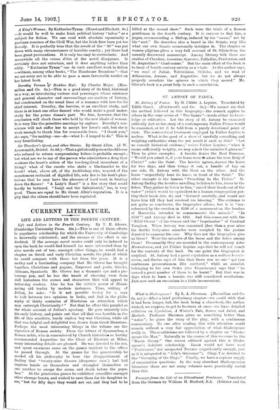C IJIMENT LITERA.T (TEE.
LIFE AND LEITERS IN THE FOURTH CENTURY.
Life and Letters in the Fourth Century. By T. R. Glover. (Cambridge University Press. 10s.)—This is one of those efforts to popularise scholarship for which the University of Cambridge is deservedly celebrated; and the success of the effort is un- doubted. If the average novel reader could only be induced to open the book he would find himself far more interested than by nine novels out of ten; amongst other things, he would find a chapter on Greek and early Christian novels, the plots of which he could compare with those hot from the press. It is a motley and a fascinating company that Mr. Glover has brought together, Christians and pagans, Emperors and poets, Greeks, Africans, Spaniards. Mr. Glover has a dramatic eye and a pic- turesqe pen, and he has the knack of choosing even from dull historians the scenes and characters that will appeal to latter-day readers. Also he has the critic's power of illumi- nating old truths by modern instances. Thus, writing of Julian, he asks : "Is it not possible to-day for a man to halt between two opinions in India, and find in the philo- sophy of thirty centuries of Hinduism an attraction which may outweigh Christianity?" Not that he offers this parallel as the whole account of Julian's apostasy. He goes minutely into his early history, and points out that all that was horrible in the life of this sensitive, lonely orphan boy was Christian, while all that was helpful and delightful was drawn from Greek literature. Perhaps the most interesting things in the volume are the vignettes of Roman society. From the letters of Symmachus, a Roman noble, who is remembered by Church historian* as having recommended Augustine for the Chair of Rhetoric at Milan, many interesting details are gleaned. He was devoted to his son, and spent enormous sums on the games incident to the offices he passed through. At the games for the quaestorship he needed all his philosophy to bear the disappointment of finding that "twenty-nine Saxons (desperate race !) had laid impious hands on themselves and strangled themselves or one another to escape the arena and death before the popu- lace." At the praetorian games he exhibited crocodiles amongst other strange beasts, and wished to save them for his daughter to see, "but for fifty days they would not eat, and they had tube killed at the second show." Such were the trials of a Roman gentleman in the fourth century. It is curious to find him, a pagan, recommending a Bishop, induced by his "cause," not by his "sect." He describes also a brawl in the Senate, very like what our own Senate occasionally indulges in. The chapter on women pilgrims gives a very full account of St. Silvia from the recently discovered manuscript. Among literary folk there are studies of Claudian, Ausonius, Synesius, Paladins, Prudentius, and St. Augustine's " Confessions." But the main effort of the book is to treat of fourth-century society as a whole. As the author says, "we read of Julian, Valentinian, Stilicho, and we read of Athanasius, Jerome, and Augustine, but we do not always properly correlate the spheres in which they moved." Mr. Glover's book is a great help to such a correlation.










































 Previous page
Previous page